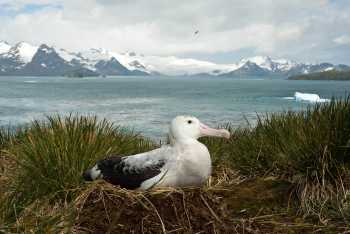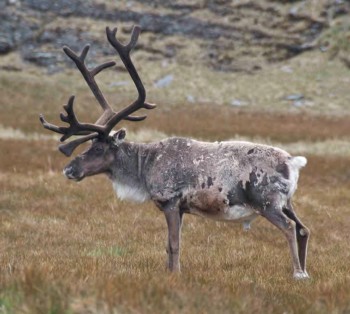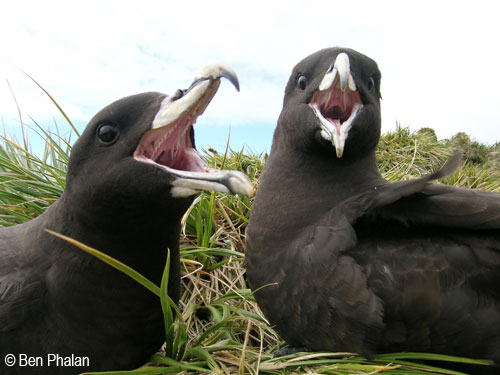Regular readers of ACAP Latest News will have been keeping abreast of the ambitious attempts to rid South Georgia (Islas Georgias del Sur)* in the South Atlantic of three species of introduced mammals: Norwegian Rats Rattus norvegicus, House Mice Mus musculus and Reindeer Rangifer tarandus.
Number 19 for December 2013 of the Newsletter of the South Georgia Habitat Restoration Project has now been published online (click here). In it Project Director Tony Martin reminds us of the completion of Phase 2 that aerial-baited 580 km² of the island against rodents earlier this year, but cautions that it will still be at last two years before its success can be guaranteed.

South Georgia (Islas Georgias del Sur)* on the horizon from rodent- (and Reindeer-) free Prion Island
Photograph by Anton Wolfaardt
Towards this it is intended to place a field team of six to eight persons led by Deputy Project Director Rob Webster supported by the yacht Pelagic Australis on the island for a month in March and April next year to ascertain whether any of the Phase-2 baiting zones will need to be re-treated during Phase 3 (which will aerial poison bait the remaining 31 zones in the southern part of the island) due to take place in 2015. Techniques to test for the presence of rodents in Phase-2 areas will include searching for sign (fresh droppings, tracks in snow), placing out “chew sticks” soaked in edible oil to record tooth marks and the use of peanut butter-flavoured wax tags that have been proven attractive to rats in previous monitoring efforts. Two other techniques to be used will be tracking tunnels with inked cards to record footprints and motion-activated trail cameras “that may even catch an elusive survivor on film”. The detection devices will be checked before the end of the trip, and then left in situ with their exact locations plotted by GPS so that they can be revisited months or years in the future.
It seems increasingly likely that the three zones totalling 128 km² that were treated in Phase 1 in 2011 are now rat-free. No sign has been recorded since the bait drop and the regular sightings of South Georgia Pintail Anas georgica georgica ducklings and South Georgia Pipits Anthus antarcticus are supportive. Fund-raising is now underway to raise the 2.5-3 million UK Pounds required for Phase 3 which represents the remaining one-third of the total rodent-infested area of the island.

Soon to be gone: a Reindeer on South Georgia (Islas Georgias del Sur)*
Photograph by Martin Collins
Other news to hand is that Phase 2 of the removal of the remaining animals in the second herd of Reindeer on the Barff Peninsula is set to take place in the next few months, following the successful removal of the Busen herd earlier this year (click here). Removing Reindeer from South Georgia (Islas Georgias del Sur)* will lead to vegetation recovery from grazing, halt trampling from their hooves and, in time, improve the habitat for breeding seabirds, including the ACAP-listed burrowing White-chinned Petrel Procellaria aequinoctialis.

White-chinned Petrels will benefit from an alien mammal-free island
Photograph by Ben Phalan
With chances seemingly good that in a few years South Georgia (Islas Georgias del Sur)* will join several other sub-Antarctic islands (such as New Zealand’s Campbell and Enderby and Australia’s Macquarie) as finally free of introduced mammals, leaving their sea and land birds in peace, thoughts will move to where next? It may be that before the end of the current decade the United Kingdom’s Gough Island and New Zealand’s Antipodes Island (the latter island’s eradication exercise now scheduled for 2015) will join the all-clear list if their House Mice can be successfully eliminated. Then the eradication experts will have to move on to an ever-decreasing list of southern islands still requiring attention (click here for a publication that lists which southern islands still support introduced mammals).
With thanks to Jennifer Lee for information.
John Cooper, ACAP Information Officer, 22 December 2103
*A dispute exists between the Governments of Argentina and the United Kingdom of Great Britain and Northern Ireland concerning sovereignty over the Falkland Islands (Islas Malvinas), South Georgia and the South Sandwich Islands (Islas Georgias del Sur y Islas Sandwich del Sur) and the surrounding maritime areas.

 English
English  Français
Français  Español
Español